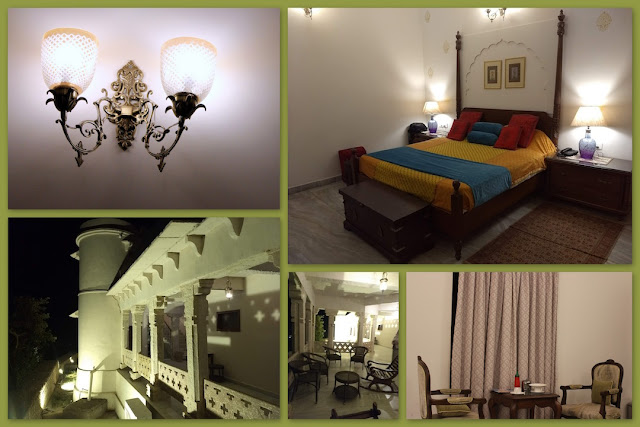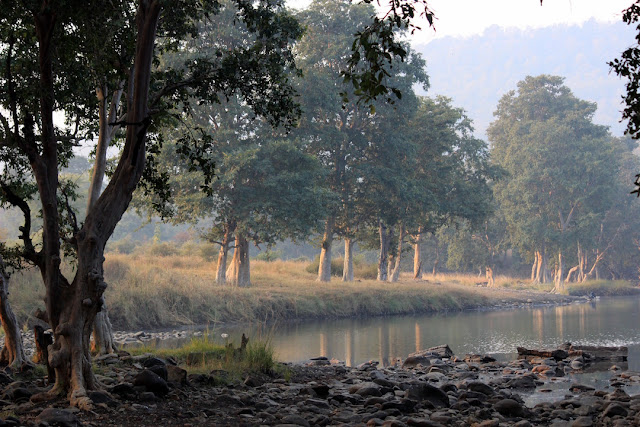And just like that two weeks had flown by and we were headed to our final destination in the Explore Madhya Pradesh saga... We were headed to Indore, by bus from Bhopal. The morning dawned bright and sunny, but while waiting for the bus at Bhopal it got quite chill, and we pulled out a shrug from our wraps and prepared for the ride ahead. The bus had a screen & the movie for the morning was Golamaal Returns... *rolls eyes*...
We reached Indore around 3pm, and made our way to the hotel, we were booked at Ginger, which was right behind the Shoppers Stop store... Our room was on the 7th floor and quite swanky.. The reception and restaurant were on the 6th floor and then ofcourse there was their signature Cafe Coffee Day on the ground floor. [The last time I stayed at a Ginger, in Mysore they had only the Cafe coffee day, no restaurant.. looks like things have changed in a decade]
That evening we decided to explore Sarafa Bazaar, famous for street food and spent about 2 hours walking up and down the narrow lanes, sampling a few dishes that sounds unique.. Was a fun evening! Got back to our room around 10pm, and drew up a plan for the next day. We decided once again to go with zoomcar , this time hiring one for the 300kms package. Omkareshwar, Maheshwar and Mandu was on our mind when we put this plan...
The next morning, we were up, ready and done with breakfast by 8am, the car was delivered and we hit the road by 9am. I remembered to pack my powerbank and cable as well. First up, we were off on the highway towards Omkareshwar [ which was about 78kms away]. Upon reaching the town, we used google maps to take us towards the temple. We were stopped at what looked like a gate, asked to pay Rs20 for entry. And then further ahead, a guy directed us to a rough spot to park the car, and then showed us to a hut of sorts asking for Rs50 for parking. We told him we would pay when leaving!
There was a small cluster of temples, including a Shiva temple near the parking lot. Took off our shoes and did a quick walk around, before heading down the stairs towards the Narmada river. Both sides of the steps flanked with shops selling everything from things to offer God to toys, jewellery and more. At the bottom of the stairs, was the row of boats waiting for customers. One guy managed to convince us to hire him, [after much bargaining, we agreed to pay him Rs700, he quoted Rs1200- we got a quick ride towards the dam, were shown a spot saying"triveni sangamam of Rivers Cauvery, Narmada and Tapi", a Vishnu temple and finally the mail Omkareshwar temple, which is located atop the hill. There was a bit of acrobats involved in getting off the boat, and I was glad I hadnt carried my DSLR. We had to jump into another boat and then walk down the length of that one before hopping out onto the steps.. Phew.. made it alive!
And then once again as we made our way up the steps, men who looked like priests came over to convince us to hire them to show us to the main deity. One man showed us a ticket and said even though it was priced at Rs350, he would take us up & inside for Rs250. We dint buy his crap, but just played along. As expected as we got close to the main shrine he started with the "well, you need to go there and get a ticket for x amount for abhishekam and archanai, and then pay me Rs300 for taking you inside.. la la la..." we dint even listen to him, cos he hadnt made things any easier, we told him to bugger off and stood in line with the rest of the crowd. In 20mins, we had reached the main shrine, said our prayers and were out. And then peacefully we made our way back down the hill towards the boats. Had to wait a few minutes for our ride to take us back! Well, it was one hellova experience alright.. Even though I was sceptical about the boat ride etc, it was well worth it... Up the flight of steps and back towards the car we went.
It was nearly 1pm, hunger pangs were starting to chime in. Deciding to take a break before hitting Maheswar [which is 66kms from Omkareshwar], we drove towards the MP Tourism property- Narmada Retreat... The property had a similar layout to the Betwa Retreat in Orchha, located right on the banks of river Narmada with rooms/cottages scattered across the vast space. There was a pool near the restaurant and we could hear kids screaming about. We settled in, ordered lunch and relaxed a bit.
Apart from the Ahilya Holkar Fort, Maheshwar is also the centre of handloom weaving [thanks to Ahilya Holkar] going back to the 5th century, Maheshwar has been producing the exquisite Maheshwari saris and fabric. The town also holds the distinction of being the capital of Rajmata Ahilya Devi Holkar’s empire during the 18th century... We spotted quite a few places with the weavers board, and some shops as well. The first thing you see as you make your way towards the fort is a life size statue of Ahilya Holkar holding her beloved God Shiva in Linga form in her hands. There is a temple where all the shiva [lingams] idols she prayed to has been preserved. Inside the fort I spotted a huge space that was dedicated to weavers, women especially and it had been set up the Queen herself decades ago. Also located within the fort is the beautiful Akhileshwar Temple, and as you walk down the endless steps, you go all the way to the River. The entire fort and area around is quite breath taking.
After spending a few hours here, we were quite exhausted and it was then time to head back to Indore, which was 96 kms away. We got back to our hotel around 7pm and put our feet up, reminiscing about the trip that it had been. Next day after a brief outing, we decided to chill in Indore and ended up going to mall down the road, catching Aquaman and walking around a bit... Was good to relax and unwind~!!
What a trip it had been, and to think it all began with a msg from S in a FB Travel group- "Who wants to come along to Corbett & Panna with us?!"
Ginger, Indore
The highway..
The boat ride at Omkareshwar...
Omkareshwar- the Temple, the boats, river Narmada...
Maheshwar- Ahilya Holkar fort leading up to River Narmada...





















































